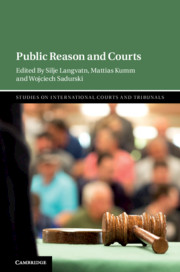Book contents
- Public Reason and Courts
- Studies on International Courts and Tribunals
- Public Reason and Courts
- Copyright page
- Contents
- Contributors
- Preface
- Acknowledgments
- 1 Taking Public Reason to Court: Understanding References to Public Reason in Discussions about Courts and Adjudication
- Part I Public Reason in Constitutional Courts
- Part II Public Reason in International Courts and Tribunals
- Part III Critical Perspective on Public Reason in Courts
- 12 Constitutional Interpretation and Public Reason: Seductive Disanalogies
- Index
12 - Constitutional Interpretation and Public Reason: Seductive Disanalogies
from Part III - Critical Perspective on Public Reason in Courts
Published online by Cambridge University Press: 22 May 2020
- Public Reason and Courts
- Studies on International Courts and Tribunals
- Public Reason and Courts
- Copyright page
- Contents
- Contributors
- Preface
- Acknowledgments
- 1 Taking Public Reason to Court: Understanding References to Public Reason in Discussions about Courts and Adjudication
- Part I Public Reason in Constitutional Courts
- Part II Public Reason in International Courts and Tribunals
- Part III Critical Perspective on Public Reason in Courts
- 12 Constitutional Interpretation and Public Reason: Seductive Disanalogies
- Index
Summary
This chapter raises questions about the seduction and limits of analogies between theorists’ account of public reason and actual constitutional jurisprudence. Examining the work product of the US Supreme Court, the chapter argues that while it does engage in reason-giving to support its decisions, those reasons are (largely) legalistic and specifically juristic reasons – not the theorists’ idealized moral-political reasons on matters of fundamental principle. If constitutional courts do not engage on matters of fundamental principle, then a public reason strategy for assuaging democratic worries about judicial review would no longer be open: Prominent liberal and deliberative democratic theorists could no longer point to the alleged superiority of constitutional courts to speak in the name of, and for, the people’s shared political principles. The chapter extends beyond the US case study by pointing to three institutional factors explaining the disanalogy between what some constitutional courts do and what public reason theories require them to do. It concludes with considerations about whether the public reason strategy might be more successfully applied to international courts.
Keywords
- Type
- Chapter
- Information
- Public Reason and Courts , pp. 323 - 349Publisher: Cambridge University PressPrint publication year: 2020
- 16
- Cited by



